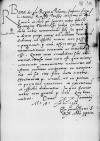List #2904
Bona Sforza do Ioannes DANTISCUSCracow, 1546-01-20
| odebrano Heilsberg (Lidzbark Warmiński), 1546-04-04 Rękopiśmienne podstawy źródłowe:
| ||||
Tekst + aparat krytyczny + komentarzZwykły tekstTekst + komentarzTekst + aparat krytyczny
Reverendo in Christo Patri, domino
Reverende in Christo Pater, sincere nobis dilecte.
Quae bene valeat.
Ex commissione sacrae reginalis maiestatis propria


 BCz, 3465, p. 320
BCz, 3465, p. 320